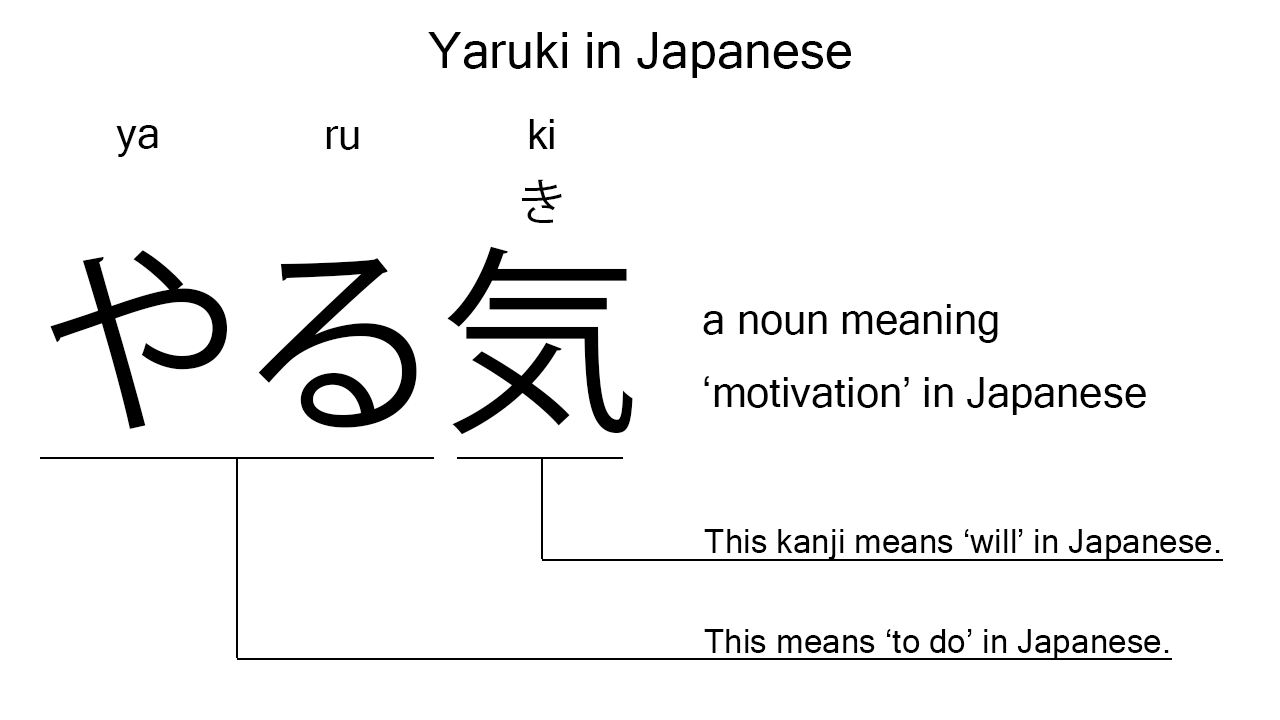What does “yaruki” mean in Japanese?
Native speakers say “yaruki” often to mean ‘motivation’ in Japanese. Perhaps, some Japanese learners know this word as it is sometimes used in Japanese movies, songs, novels, manga, anime, and the like. In this blog post, however, I will explain this word in detail based on its grammatical components. And also, I will explain how to use it through example sentences. My explanations would help Japanese learners understand “yaruki” more clearly. Then, let’s get started!
Contents
Definition and meanings of “yaruki”
Let me start with the definition and meanings of “yaruki”.
- yaruki – やる気 (やるき) : a noun meaning ‘motivation’ in Japanese. Depending on the context and situation, this can also mean ‘willingness’ or ‘eagerness’.
The definition and meanings are not that difficult. The meanings seem to be based on the same concept: wanting to do something. To understand this noun more clearly, however, let me explain its grammatical components in detail, one by one.
What does “yaruki” literally mean in Japanese?
“Yaruki” consists of the following two components:
- yaru – やる : a verb meaning ‘to do’, ‘to perform’, ‘to play’, ‘to try’, or ‘to conduct’ in Japanese.
- ki – 気 (き) : a noun meaning ‘mood’, ‘mind’, ‘feeling’, ‘will’, or ‘spirit’ in Japanese.
In Japanese, verbs in the plain form can work like modifiers to describe their following words. From these two components, therefore, we can understand that the formed noun literally means ‘a will to do something’ in Japanese. This literal interpretation is more or less in line with the actual meanings, I think.

When we meet new Japanese words, we should check their grammatical components in detail to understand their meanings clearly and deeply. In many cases, components tell us a lot about the meanings of the words they form. Actually, here, we could get the better understanding of “yaruki” through the detailed check above.
So far, I’ve explained the definition and meanings of “yaruki” together with its grammatical components. Then, let me explain how to use it through the example sentences below.
Example #1: how to say “motivation” in Japanese
watashi wa yaruki ga aru – 私はやる気がある (わたしはやるきがある)
I have motivation.
Below are the new words used in the example sentence.
- watashi – 私 (わたし) : a pronoun meaning ‘I’ in Japanese.
- wa – は : a binding particle working as a case marker or topic marker. In the example, this works as a topic marker after “watashi” to put a focus on it.
- ga – が : a case particle used to make the subject word or the object word in a sentence. In the example, this is used after “yaruki” to make the subject in the sentence.
- aru – ある : a verb used to say that something exists. In the example, this is used to say that the motivation exists.
This is a typical usage of “yaruki”. In this example, it works as a part of the commonly-used phrase, “yaruki ga aru”, which means ‘to have motivation’ or ‘to be motivated’ in Japanese.
Example #2: another usage of “yaruki”
kanojo wa yaruki ga nai to it ta – 彼女はやる気がないと言った (かのじょはやるきがないといった)
She said that she didn’t have motivation.
Below are the new words used in the example sentence.
- kanojo – 彼女 (かのじょ) : a pronoun meaning ‘she’ in Japanese. In the example, this works together with the binding particle, “wa”, to become the subject in the sentence.
- nai – ない : an i-adjective used to say that something does not exist. In the example, this is used to deny the existence of the motivation.
- to – と : a case particle working as a quote marker. In the example, this works as a quote marker after the clause, “yaruki ga nai”, to indicate what she said.
- it – 言っ (いっ) : one conjugation of the verb, “iu“, which means ‘to say’ or ‘to tell’ in Japanese. In the example, it has been conjugated for the better connection with its following word.
- ta – た : an auxiliary verb used after a verb, adjective, or auxiliary verb to make its past tense form. Probably, this is well known as a part of Japanese ta form. In the example, this is used after “it” to make its past tense form, “it ta”.
This is another typical usage of “yaruki”. In this example, it works as a part of the commonly-used phrase, “yaruki ga nai”, which means ‘not to have motivation’ or ‘not to be motivated’ in Japanese. When we want to mean ‘motivation’ in Japanese, anyway, “yaruki” is always a very good option.
Summary
In this blog post, I’ve explained the definition and meanings of “yaruki” in detail based on its grammatical components. And also, I’ve explained how to use it through the example sentences. Let me summarize them as follows.
- yaruki – やる気 (やるき) : a noun meaning ‘motivation’ in Japanese. Depending on the context and situation, this can also mean ‘willingness’ or ‘eagerness’. This noun consists of two components, “yaru” and “ki”, which literally mean ‘a will to do something’ in Japanese. This literal interpretation is more or less in line with the actual meanings, I think.
Hope my explanations are understandable and helpful for Japanese learners.